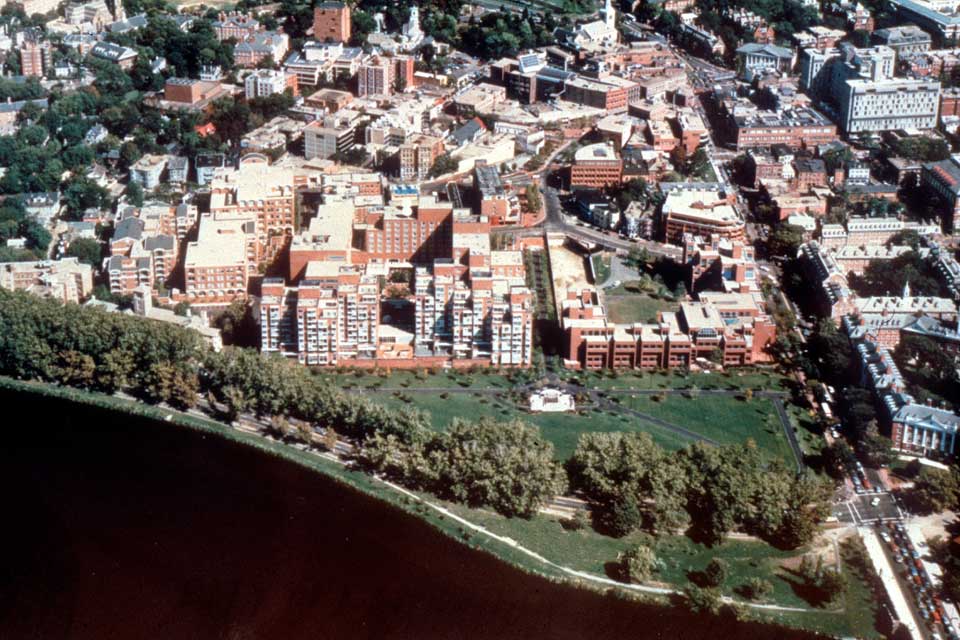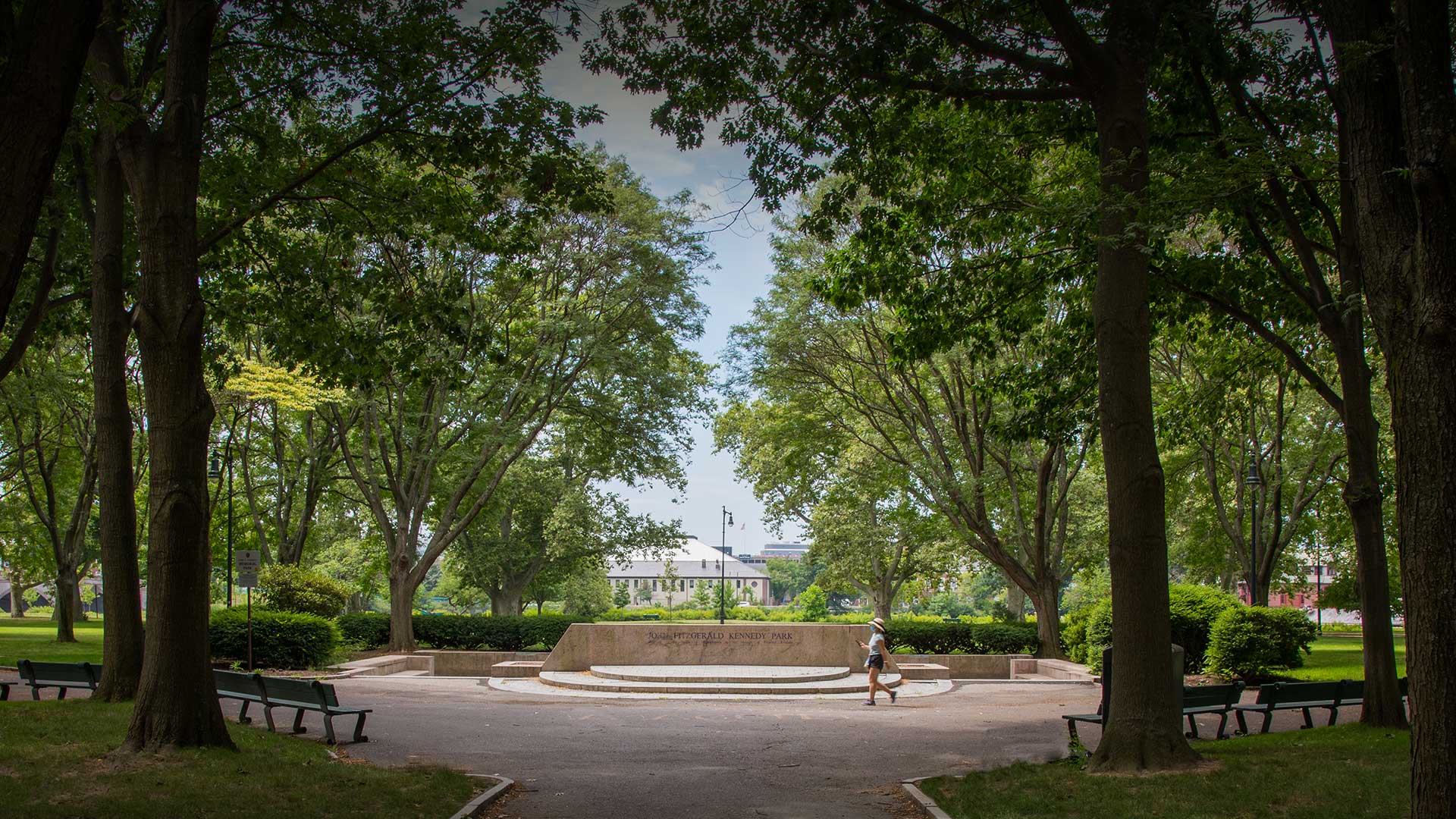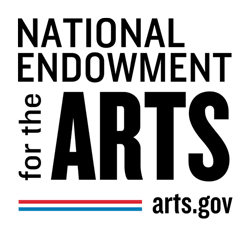Developed over the course of a decade beginning in 1976, this five-acre park is the premier memorial dedicated to President John F. Kennedy in his home state. The landscape was designed by Carol Johnson, the first American woman to receive the American Society of Landscape Architects (ASLA) Medal, as a node of connectivity between the Charles River and Harvard University, Kennedy’s alma mater. Now facing years of deferred maintenance, action is needed to save this park for the thousands of Harvard students, locals, and tourists who treasure its abundance of trees, pathways, and (currently dormant) focal point water feature.
History
Born in Elizabeth, New Jersey, Carol Johnson graduated from Wellesley College in 1951 and earned a landscape architecture degree from Harvard in 1957. Hired by The Architects Collaborative (TAC) in 1958, she started her own practice only one year later, at a time when there were few women landscape architects working on urban design and planning issues.
Johnson taught in the Planning Department at Harvard’s Graduate School of Design (GSD) from 1966 to 1973. During this period she aIso worked as part of President Johnson’s Model Cities Program at the North Commonwell in Lowell, Massachusetts, and completed numerous campus planning and design projects, at institutions including Boston College and Duke University. She was an early collaborator with scientists and soil experts on brownfield remediation projects, including the Mystic River Reservation in Massachusetts and Bell Station on Lake Cayuga in Upstate New York. She became a Fellow of the American Society of Landscape Architects in 1982, and in 1998 was the first American woman to receive the ASLA Medal.
In 1976 a five-acre site, situated on Memorial Drive along the Charles River, was chosen as the location for the Commonwealth of Massachusetts’ monument honoring President John F. Kennedy. Originally selected to be the location of the John F. Kennedy Library—which was ultimately built in Dorchester due to civic opposition in Cambridge—the land was used as a car barn until the state allocated the land to be the site of the state’s official JFK memorial park.
 Aerial of John F. Kennedy Memorial Park, Cambridge, MA; photo courtesy IBI.
Aerial of John F. Kennedy Memorial Park, Cambridge, MA; photo courtesy IBI.
Boston’s Metropolitan District Commission selected Johnson’s firm, Carol R. Johnson Associates, to realize the park’s design, in consultation with a 21-member citizen’s advisory committee that included JFKs daughter, Caroline Kennedy Schlossberg. Johnson and team identified several underlying physical constraints to the site, including issues of soil contamination, drainage problems, and a series of already standing grand sycamore trees that lined Memorial Drive. Johnson took care to design the layout of the park around these existing trees, noting that they aided in creating a “link” between the park and the nearby sections of the Charles River Reservation.
Johnson’s belief in the social value of good design and the importance of each site’s natural and cultural history have influenced her practice as a landscape architect. She carefully considered the broader context of her designs and had a sensitivity to her surroundings, and in the case of Kennedy Park in particular, this is evident in the ways in which she envisioned the park as part of the Charles River Reservation.
Johnson and project manager Jennifer Jones designed a linear park that contained spaces for relaxation and gathering, creating a central open lawn for passive recreation and using beech and other plantings to form shaded areas along the pathways. They created a linkage between Harvard’s lively urban landscape and the more restful Reservation by using infill to tilt the park’s lawn south toward the Charles River, and aligning the major east-west walkway with Harvard’s Gore Hall to the east, the residence hall in which Kennedy lived as a student, and a view of the River to the west.
The landscape’s focal point is a raised, terraced platform that fronts a sunken square bordered by low stone retaining walls with built in benches. At its center is a granite memorial fountain placed on axis with an allée of honey locusts that connects to Harvard Square. Designed by John Gustafson, the fountain features water running over engraved quotations by Kennedy. Johnson has recalled that the laminar flow of water over rocks during a hike in New Hampshire gave her the idea for the fountain. The Kennedy family was involved in choosing the quotes engraved in the rock face of the fountain, as well as at the stone pillars that mark the park’s entrances.
A groundbreaking ceremony was held for the park on November 4, 1985, and it was dedicated and officially opened on May 29, 1987, on what would have been Kennedy’s 70th birthday. Members of the Kennedy family participated in both events.
 Children playing on the fountain at John F. Kennedy Memorial Park; photo courtesy CRJA.
Children playing on the fountain at John F. Kennedy Memorial Park; photo courtesy CRJA.

Threat
In TCLF’s July 2006 Carol Johnson Oral History, she noted that “...favorite landscapes clearly have to be maintained so that they actually express what they were meant to express.” Currently, the basic needs of Kennedy Park are not being met. The fountain, which memorializes Kennedy’s words, has not been functional for years, and the paved pathways are in a state of deterioration. The issues of soil composition and drainage, which have always been considerations at this site, have not been remedied in recent years, and a number of trees and shrubs are in need of replanting.
The structure of the park is intentionally simple, designed to respond to the environment in which it sits. The park is utilized by the Harvard community daily, as well as by the locals and tourists who flock to this part of Cambridge, and their collective use both emphasizes the importance of this space and the urgent need for its maintenance going forward.
What You Can Do to Help
Contact the Massachusetts Department of Conservation and Recreation (DCR) to urge the DCR Community Affairs office to dedicate funds to restore the fountain and to conduct urgently needed routine maintenance of the pathways, soil drainage, and plantings, via e-mail mass.parks@mass.gov, or by mail:
DCR Community Affairs
251 Causeway Street, 9th Floor
Boston, MA 02114
DCR Office: (617) 626-1250














